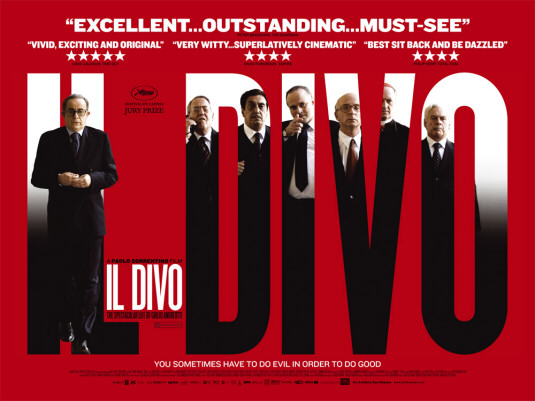Il Divo
 "I recognize my limits but when I look around I realise I am not living exactly in a world of giants," says Giulio Andreotti, Italy's dominant post-Second World War politician, in Paolo Sorrentino's 'Il Divo', the most exciting narrative fiction feature film I've seen this year.
"I recognize my limits but when I look around I realise I am not living exactly in a world of giants," says Giulio Andreotti, Italy's dominant post-Second World War politician, in Paolo Sorrentino's 'Il Divo', the most exciting narrative fiction feature film I've seen this year.
Sorrentino's films look like Edward Hopper paintings, dreamed by people who have been lying face down in the mud after attending a mid-90s rave. And that's a compliment. His 'The Consequences of Love' is one of the most compelling (in story) and enthralling - in sound and image - films of the past decade. He fuses elegantly structured images with dance music to tell tales about broken men - Mafia accountants, small town moneylenders, and, in 'Il Divo', his current film, corrupt Prime Ministers who end up appearing to be the embodiment of menace. The protagonists in 'Consequences', 'Il Divo', and 'The Family Friend' (the moneylender) are all capable of evil while feeling sorry for themselves; Sorrentino is so good at getting under the skin of his guys that his skill with surfaces seems almost contradictory.
'Il Divo' is a complicated film if, like me, you lack intimate knowledge of Italian politics since 1972 (!); but its central performance is so detailed and immersive that you'll forget you don't know who's who at any given point - the roll call of Mafia hoods, Catholic cardinals, and elected representatives eventually blending into a seamless garment of corrupted power. And you're never in any doubt over who is in charge: Andreotti rules the world, and the actor Toni Servillo rules the film, his performance an invitation to face the terror of what happens when greed and ego combine to shred their victim's moral compass.
The most resonant thing I can say about 'Il Divo'?
It's the film 'The Godfather Part III' could have been.